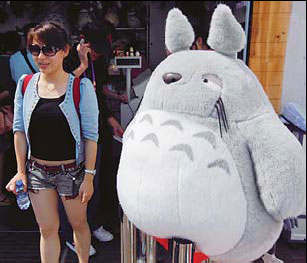Spend time upon a golden throne
 |
| A visitor has her photo taken alongside an anime toy. |
For some reason visitors to the Japanese Corporate Pavilion are forbidden from taking photographs, so they have to rely on their memories when recounting the contents of the exhibits to their friends.
Maybe it is to protect the world's most expensive toilet, which is proudly exhibited in the pavilion.
Each visitor to Japanese Corporate Pavilion receives a bag with a chocolate bar and several small gifts, such as a satchel of soy sauce. In the bag, some lucky visitors also find an invitation to try the "world's most comfortable toilet".
"The gold toilet looks really expensive," said Hong Jiao, one lucky visitor who got the chance to use the bathroom.
And he is right.
Inax Corporation's Regio Gold Toilet is also billed as the most expensive toilet in the world. It comes with some surprisingly innovative features, like a built-in sound system, automatic flusher, antibacterial properties and a hefty price tag - $40,000.
Based on the theme "Better Life from Japan", the Japanese Corporate Pavilion, which covers 4,000 square meters, is housed in an old factory building previously owned by Jiangnan Shipyard (Group) Company. The pavilion is funded by 16 Japanese corporations and entities.
Japanese culture has an assured place in Asia, which explains why the Japan Pavilion as well as Japanese Corporate Pavilion have both caught the attention of so many visitors.
"I have overheard that there is a Ghibli (Japanese animation) store opened at Japanese Corporate Pavilion, which sells all kinds of Totoro (an anime character) products," said 29-year-old Wang Liu, who is a huge fan of Japanese anime. "It is the best memory of my entire childhood, I just cannot miss it."
Indeed, "made in Japan" always brings unique experiences to people all over the world. Apart from its incredibly popular cuisine, which can be easily found outside the pavilion, amazing surprises are hidden inside the pavilion, waiting to be discovered.
Divided into small individual units, exhibitions including medical care, logistics, food supplements, environmental protection, tourism and elements of Japanese culture, are presented by sponsored corporations with audiovisual displays on different size screens.
"I saw lot of soft-sell advertising during the visiting," 34-year-old Yang Zhongkai joked. "However, I didn't feel like I was wasting my time watching them.
"Actually, there are many great ideas and concepts hidden in those films," Yang said. "Products with advanced technologies that have been introduced are quite interesting from my personal point of view."
 0
0 






